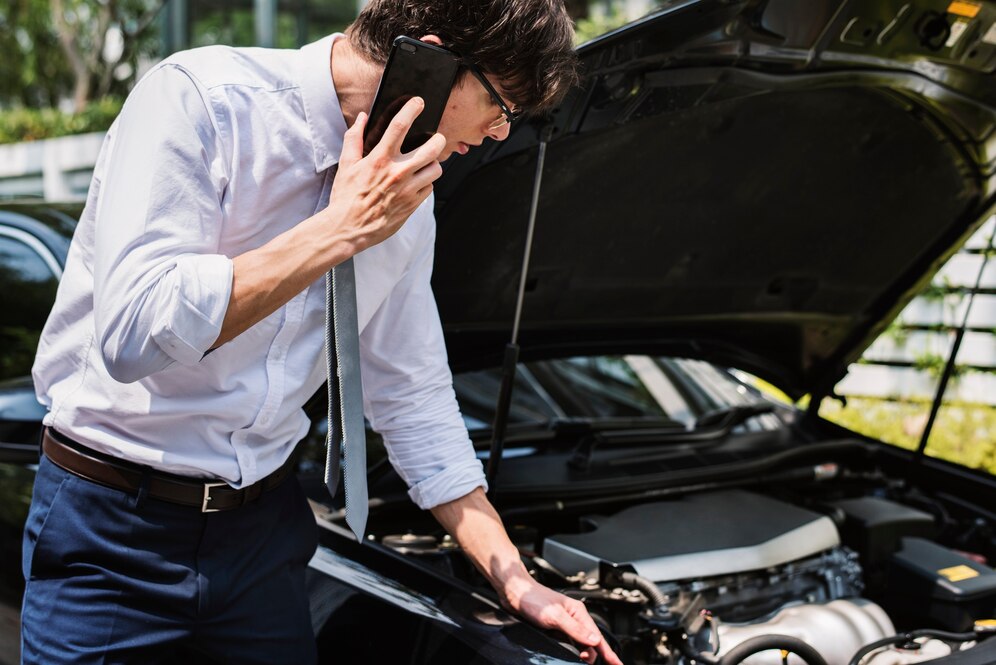intorduction
Car repairs can be a significant financial burden, especially when mistakes lead to unnecessary expenses. Many car owners unknowingly make errors that result in higher costs, reduced vehicle lifespan, and even safety hazards. By understanding and avoiding these common car repair mistakes, you can save thousands of dollars and keep your car running smoothly for years to come.
Ignoring Dashboard Warning Lights
Modern vehicles are equipped with advanced diagnostic systems that alert drivers to potential issues. Ignoring dashboard warning lights can lead to serious problems, including engine failure or brake system malfunctions.
Common Warning Lights You Shouldn’t Ignore
Check Engine Light
Could indicate anything from a loose gas cap to a serious engine problem.
Oil Pressure Light Low
Oil pressure can cause engine damage if not addressed immediately.
Battery Warning Light Ignoring this may result in being stranded with a dead battery.
Light Brake System
Failing brakes pose a significant threat to safety and should be
checked right away. Solution
Whenever a warning light appears, consult your owner’s manual and seek professional assistance if necessary. Addressing issues early can prevent costly breakdowns and repairs. Putting off routine maintenance Routine maintenance is crucial for keeping your car in good condition and preventing expensive repairs. Because of a lack of time or a desire to save money, many drivers disregard essential services. However, skipping maintenance can lead to catastrophic failures that cost much more in the long run.
Essential Maintenance Services
Oil Changes
Dirty or low oil can cause engine wear and overheating.Tire Rotations and Alignment: Prevents uneven tire wear and improves fuel efficiency.Brake Inspections: Ensures your braking system is functioning properly and safely.Fluid Checks and Replacements: Includes transmission fluid, coolant, brake fluid, and power steering fluid.
Solution
Follow the manufacturer’s recommended maintenance schedule found in your owner’s manual. Regular servicing keeps your vehicle in peak condition and prevents unexpected breakdowns.
Using Cheap or Incorrect Parts
Many car owners try to save money by purchasing inexpensive aftermarket parts. Even though some parts from the aftermarket are reliable, using bad or low-quality parts can cause serious problems with performance and cost more. Risks of Using Cheap Parts:
Premature Wear and Tear: Cheap parts often fail sooner, requiring frequent replacements.
Potential Compatibility Issues
rrect parts may not fit properly, causing additional damage. Safety Hazards: Subpar brake pads, tires, or suspension components can compromise your safety on the road.
Solution
Always purchase high-quality OEM Original Equipment Manufacturer or reputable aftermarket parts. Research brands and consult with a trusted mechanic before making a purchase.
Delaying Minor Repairs
Small issues, such as a minor coolant leak or a slight brake squeal, can quickly escalate into major problems if left unattended. Many drivers ignore these minor issues to save money, only to face much higher repair bills later.
Consequences of Delaying Repairs
Coolant Leaks: Can lead to engine overheating and expensive repairs.
Brake Wear: Worn brake pads can damage rotors, increasing replacement costs.
Suspension Problems: A slight vibration or clunking noise could indicate a failing component that worsens
 over time.
over time.
Solution
Address minor repairs promptly before they develop into expensive fixes. Regular inspections and timely maintenance can help catch small issues early.
Choosing the Wrong Mechanic
Not all mechanics are equally skilled or honest. Selecting an unqualified or dishonest mechanic can result in improper repairs, overcharging, or unnecessary replacements.
How to Choose a Reliable Mechanic:
Check Reviews
Look for highly rated mechanics on Google, Yelp, or automotive forums.
Ask for Certifications
A professional with ASE Automotive Service Excellence
certification is qualified. Compare prices from multiple repair shops to make sure you’re getting a fair deal. Get multiple quotes. Request a Comprehensive Breakdown: A reputable mechanic should provide an itemized estimate and an explanation of the required repairs.
Solution
Do your research before selecting a mechanic. A trustworthy professional will provide honest advice and quality service without unnecessary charges.
Attempting DIY Repairs Without Proper Knowledge
While DIY car maintenance can save money, attempting complex repairs without proper knowledge or tools can lead to costly mistakes. The majority of car owners lack the expertise and specialized equipment necessary for certain repairs. Common DIY Mistakes:
Incorrectly Installing Brake Pads: Can lead to brake failure or uneven wear.
Over Tightening Bolts
May cause thread damage or break crucial components.
Mishandling Electrical Systems: Can lead to shorts, sensor failures, or even a dead battery.
Solution
Know your limits. While basic maintenance like oil changes and air filter replacements are manageable, leave complex repairs to certified mechanics.
Using the Wrong Type of Fluids
For optimal performance, distinct kinds of fluids are required for various vehicles. Using the wrong fluid can cause serious damage to your engine, transmission, or braking system.
Examples of Incorrect Fluid Use
Incorrect engine oil: May affect lubrication and cause excessive heat. Mismatched Transmission Fluid: May cause shifting problems or transmission failure.
Incorrect Coolant Type: Can lead to overheating and corrosion in the cooling system.
Solution
Always use the fluids recommended in your owner’s manual. If you’re unsure, consult a professional before making a change.
rlooking Tire Maintenance
Tires are essential for vehicle safety and performance, yet many drivers neglect proper tire care. Driving on underinflated, overinflated, or worn-out tires increases the risk of accidents and can lead to costly repairs.
Tire Maintenance Tips
Check Tire Pressure Regularly
Underinflated tires decrease fuel efficiency and wear unevenly.
Rotate Tires Every 5,000-7,500 Miles
Promotes even tread wear and extends tire life.
Inspect Tread Depth
Replace tires when tread depth falls below 2/32 of an inch.
Get Regular Wheel Alignments
Prevents uneven tire wear and improves handling.
Solution
Stay proactive with tire maintenance to enhance safety and reduce long-term costs.
Ignoring Unusual Noises or Vibrations
Strange noises or vibrations often indicate underlying problems that shouldn’t be ignored. Many drivers dismiss these warning signs, assuming they are minor or temporary, only to face costly repairs later.
Common Warning Signs
Squealing Brakes: Worn brake pads need replacement.Engine noise: Possible problems with the bearings or pistons. Vibrations While Driving: Could be related to misaligned wheels, worn suspension, or brake issues.

Solution
Get your car checked right away if you hear any unusual noises or vibrations to prevent further damage. Conclusion
Avoiding these common car repair mistakes can save you thousands of dollars and ensure your vehicle stays in peak condition. By staying proactive with maintenance, using quality parts, choosing a reliable mechanic, and addressing issues early, you can extend your car’s lifespan and reduce repair costs. Invest in regular upkeep, and your vehicle will reward you with reliable performance for years to come.

